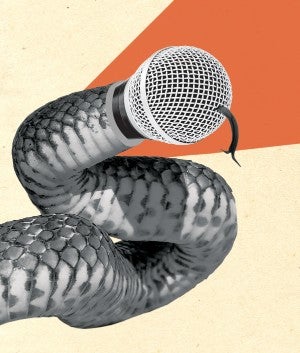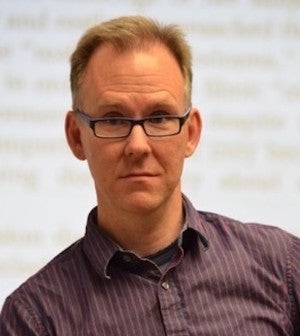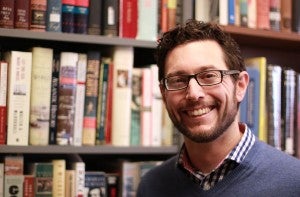LENS Arts, Humanities, and Social Sciences
Getting Real About Fake News
Yes, We've Already Been Here

With the 2016 national election season, fake news—the phenomenon, that is—rocketed into the public consciousness, and hasn't left. It turns out we've already been here. But that doesn't offer much solace. Why has it happened? Two Case Western Reserve University faculty experts offer insight.*
T. Kenny Fountain, PhD, associate professor of English, is writing a book, To See What is Persuasive: Politics, Affect and the Rhetorical Imagination, examining how passion-charged political discourse shapes our emotions and encourages a highly partisan world view. Peter Shulman, PhD, associate professor of history, studies—among other topics—technology, communication and American politics.
The Consequences of Fake News

T. Kenny Fountain, associate professor
Kenny Fountain: Fake news not only refers to deliberately fraudulent news stories; the term has become as well a pejorative way to delegitimize things that are true, things that we do have ample evidence for—that is, a well-sourced, factual, well-framed news story. I'm concerned by how both fake news and the slur "fake news" spread so easily through social media. There are really interesting and frightening social-science studies that find that when people hold a false belief and that belief is disclaimed, that disclaimer might have no effect on belief and might even support that false belief. So, fake news potentially has powerful consequences.
The Roots

Peter Shulman, associate professor
Peter Shulman: A premise of how we want and expect our democracy to work is grounded in the ideals of rationality and a public sphere where we can agree on facts and debate what choices we're going to make as a society. For much of the 20th century, we've had a pretty close approximation of that with professionalized journalism. Before the late 1990s, there was a boundary: Fabricated stories could not cross into the public sphere and maintain respectability. That starts to break down, partly because technological change lowered the cost of entry to become a journalist. There are so many other places people can go to get news, which contributes to partisan and ideological news sources that cater to, nurture and cultivate niche views of the world. Historically, then, this brings us back to the 19th century, where the news was often highly ideological, partisan and fragmented. In the big sense, this isn't unfamiliar to the American experience.
KF: Fake news also plays upon existing currents that have been around since the '20s and '30s with radio. There's always been alternative, conspiracy-theory radio; it moved to television in the early '90s with Rush Limbaugh. That kind of partisan programming also started putting pressure on conventional news media because people were not only able to select the ideology they wanted, but also get the news from the same partisan source.
The Mainstream Media and its Critics
PS: What's bizarre and not often acknowledged is this symbiotic relationship between the maligned mainstream media and the hyperpartisans. They don't have any material to work with without the mainstream media. Their entire shtick depends on the mainstream media, either as a foil or a source.
KF: What's so fascinating and troubling is that there's always been this antagonistic relationship with media. But it's interesting that we now have a presidential administration that uses both fraudulent stories and the slur "fake news" quite deliberately and that has set itself against nearly all forms of media, except for a couple.
PS: If the election had gone a different way, would we still be having this conversation? I'm not sure how much different it would be. The news would be in the same place it is today.
New Conversations
KF: One of the things I love about this horrible fake news [is that] we're starting to have a much more nuanced, smarter discussion about the role of emotion and passion in our politics and in the way we form attitudes.
* The conversation was edited for length.





